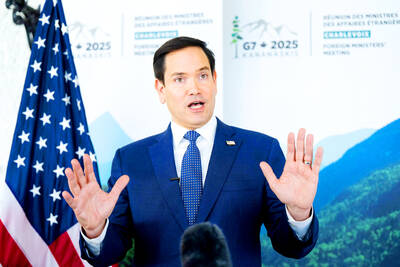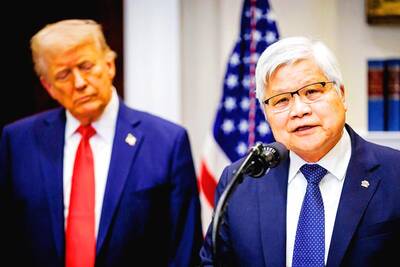The US dollar traded lower on Friday against the euro, dropping below the key 1.4000 level in post-Christmas trading as the greenback consolidated the week within tight ranges amid thin turnover.
The euro fetched US$1.4025 in New York against US$1.3991 on Wednesday evening.
The currency market was closed for Christmas on Thursday and experts said the low turnover during the largely holiday period led to sharp movements.
David Solin of Foreign Exchange Analytics said investors should not read too much into the currency movements during this thin trading period.
The euro spent the majority of the week consolidating versus the US dollar between 1.3915 and 1.4125, and “these levels remain the proverbial lines in the sand,” said Terri Belkas, currency Strategist with Forex Capital Markets.
“A break above or below the bounds will suggest that price will continue to move in that direction,” she said.
The dollar fell 1 percent against the euro the past week and was up about 1.5 percent versus the pound and yen by Friday’s close, Belkas said.
The dollar was slightly higher at ¥90.78 in New York Friday from Wednesday’s close of ¥90.42 as the Japanese currency came under pressure after gloomy data showed that the global financial and economic crises were taking a major toll on Asia’s biggest economy.
Asian currencies also fell last week, led by the Indian rupee, on concern the deepening global economic slump will hurt the region’s growth prospects and exports.
The rupee was the worst performer among the 10 most-active Asian currencies as a finance ministry report last week showed the economy may expand at the slowest pace since 2003.
Thailand’s baht had the biggest weekly loss in almost seven months as the government predicted an onset of a recession.
A Japanese report showed industrial production fell the most in 55 years last month.
“While we are not calling ... a structural collapse in Asian currencies, we think sentiment and further macroeconomic weakness are likely to continue to weigh on them for now,” said Nizam Idris, a currency strategist with UBS AG in Singapore. “Trading will remain slow until early 2009.”
The rupee slid 2.5 percent this week to 48.445 a dollar in Mumbai, Bloomberg data showed. Indonesia’s rupiah fell 1.4 percent to 11,100 and the New Taiwan dollar dropped 1.5 percent, the most in two months, to NT$33.025.
Japan’s factory output tumbled 8.1 percent last month from October, when it dropped 3.1 percent, the Trade Ministry said on Friday.
The Thai economy will contract 2 percent to 3 percent this quarter and shrink in the three months through March as well, Somchai Sujjapongse, a spokesman at the finance ministry said on Wednesday.
The MSCI Asia Pacific Index of regional shares dropped 2.2 percent this week, extending the year’s losses to almost 45 percent, the worst in its two-decade history.
Malaysia’s ringgit fell 0.3 percent last week, extending this year’s drop to 4.8 percent, compared with a 28 percent loss in South Korea’s won and a drop of 18.6 percent in India’s rupee, the worst performers in Asia this year.
The ringgit traded at 3.4800 against the dollar in Kuala Lumpur. It reached 3.6474 on Dec. 5, the lowest level since November 2006.
The Vietnamese dong fell to a record low after the State Bank of Vietnam on Thursday devalued the currency by 3 percent to help spur exports.
Policy makers are relying on a weaker currency to help boost shipments of the nation’s garments and coffee as a government report on Wednesday showed the Southeast Asian economy expanded this year at the slowest pace in nine years.
The dong weakened to 17,490 a dollar on Friday, the lowest since Bloomberg started tracking the exchange rate in June 1993. It ended the week 2.5 percent lower at 17,425 after the biggest two-day slide in a decade.

‘CROWN JEWEL’: Washington ‘can delay and deter’ Chinese President Xi Jinping’s plans for Taiwan, but it is ‘a very delicate situation there,’ the secretary of state said US President Donald Trump is opposed to any change to Taiwan’s “status quo” by force or extortion and would maintain that policy, US Secretary of State Marco Rubio told the Hugh Hewitt Show host on Wednesday. The US’ policy is to maintain Taiwan’s “status quo” and to oppose any changes in the situation by force or extortion, Rubio said. Hewitt asked Rubio about the significance of Trump earlier this month speaking with Taiwan Semiconductor Manufacturing Co (台積電) chairman C.C. Wei (魏哲家) at the White House, a meeting that Hewitt described as a “big deal.” Asked whether the meeting was an indication of the

‘RELATIVELY STRONG LANGUAGE’: An expert said the state department has not softened its language on China and was ‘probably a little more Taiwan supportive’ China’s latest drills near Taiwan on Monday were “brazen and irresponsible threats,” a US Department of State spokesperson said on Tuesday, while reiterating Washington’s decades-long support of Taipei. “China cannot credibly claim to be a ‘force for stability in a turbulent world’ while issuing brazen and irresponsible threats toward Taiwan,” the unnamed spokesperson said in an e-mailed response to media queries. Washington’s enduring commitment to Taiwan will continue as it has for 45 years and the US “will continue to support Taiwan in the face of China’s military, economic, informational and diplomatic pressure campaign,” the e-mail said. “Alongside our international partners, we firmly

KAOHSIUNG CEREMONY: The contract chipmaker is planning to build 5 fabs in the southern city to gradually expand its 2-nanometer chip capacity Taiwan Semiconductor Manufacturing Co (TSMC, 台積電), the world’s biggest contract chipmaker, yesterday confirmed that it plans to hold a ceremony on March 31 to unveil a capacity expansion plan for its most advanced 2-nanometer chips in Kaohsiung, demonstrating its commitment to further investment at home. The ceremony is to be hosted by TSMC cochief operating officer Y.P. Chyn (秦永沛). It did not disclose whether Premier Cho Jung-tai (卓榮泰) and high-ranking government officials would attend the ceremony. More details are to be released next week, it said. The chipmaker’s latest move came after its announcement earlier this month of an additional US$100 billion

PERMIT REVOKED: The influencer at a news conference said the National Immigration Agency was infringing on human rights and persecuting Chinese spouses Chinese influencer “Yaya in Taiwan” (亞亞在台灣) yesterday evening voluntarily left Taiwan, despite saying yesterday morning that she had “no intention” of leaving after her residence permit was revoked over her comments on Taiwan being “unified” with China by military force. The Ministry of the Interior yesterday had said that it could forcibly deport the influencer at midnight, but was considering taking a more flexible approach and beginning procedures this morning. The influencer, whose given name is Liu Zhenya (劉振亞), departed on a 8:45pm flight from Taipei International Airport (Songshan airport) to Fuzhou, China. Liu held a news conference at the airport at 7pm,